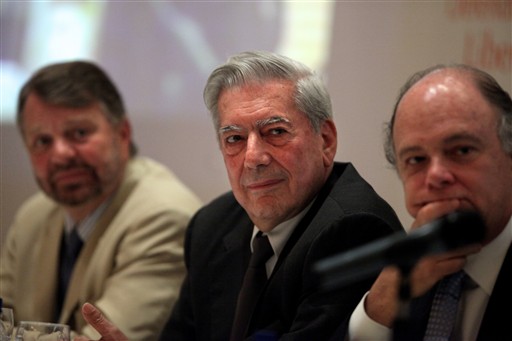Venezuela: Chávez's Persecution, and No Debate

Jorge Castañeda, Mario Vargas Llosa, and Enrique Krauze at the Cedice symposium.
Simon Romero of the NYT reports on Raul Baduel's arrest, Chávez Seeks Tighter Grip on Military, the purpose being
Since February, Mr. Chávez has moved against a wide range of domestic critics, and his efforts in recent weeks to strengthen his grip on the armed forces have led to high-profile arrests and a wave of reassignments.Romero's article names former members of the military Raúl Baduel, Carlos Millán, Wilfredo Barroso and Otto Gebauer, all who have been arrested. Jaime Requena, biology professor at the Foundation Institute of Advanced Studies of Venezuela, was fired from his job after criticizing science funding under Chávez.These are seen here as part of a larger effort by Mr. Chávez to cement loyalty in the military, where some officers are growing resentful at what they see as his micromanagement and politicizing of a proud and relatively independent institution.
But Requena, Baduel, and the others are not alone.
Readers of this blog remember that Chávez is actively persecuting the opposition: Manuel Rosales obtained political asylum in Peru after finding out that he had been sentenced to a 30-year jail term without a trial. The governors of the states of Miranda, Carabobo and Táchira, states that Chávez does not control, are under pressure. The mayor of Caracas had the most populous borough removed from his authority and placed under a Chávez appointee. Vehement Chávez critic and journalist Teodoro Petkoff is under investigation.
In the middle of this oppression, Cedice (Centro de Divulgación del Conocimiento Económico), a Venezuelan pro-free trade think tank, is holding a very high-profile symposium. The national guard, an education ministry official and state TV interrupted the seminar, in an effort to shut it down. But there was more to come.
This week Chávez demanded that Globovisión, the last remaining independent TV station in the country, be punished, i.e., closed. A property of station president Gillermo Zuloaga was raided last week and now Zuloaga is charged with the "illegal storage" of Toyota pick-up trucks.
Globovisión has not demurred; to the contrary. Globovisión broadcasted the attempts to shut down the Cedice seminar. Additionally, when writers Álvaro Vargas Llosa and his father Mario Vargas Llosa were detained upon arrival at Caracas airport, the station broadcast live Álvaro's call from the airport and later interviewed him live as soon as he was released on Wednesday.
The news of the Vargas Llosas' detentions rippled through Latin America: a committee of the Brazilian senate was to ask the Venezuelan government for an explanation for the "humiliating act."
Both writers, along with Mexican historian Enrique Krauze, former Mexican foreign minister Jorge Castañeda and Colombian writer Plinio Apuleyo Mendoza are featured speakers at a conference on freedom and democracy at Cedice, a Venezuelan think tank. During a TV interview, Álvaro Vargas Llosa explained that,
“We have come to share the idea that political freedom is fundamental for Latin American civilization. The ideas that economic freedom and respect to private property are basic ingredients for prosperity.”Chávez is in the middle of a four-day-long cadena, celebrating the 10th anniversary of his TV program Aló Presidente, which all licensed TV and radio stations in the country have to broadcast live. During yesterday's rambling monologue he invited the conference speakers to debate him live at 11AM Saturday morning. Mario Vargas Llosa agreed almost immediately after Chávez issued the invitation, on the condition that it would be a debate with Chávez himself. Enrique Krauze also agreed, requesting that there be clear rules for a debate so it wouldn't become a [Chávez] monologue, saying
"It would be a splendid opportunity for the Venezuelan TV audience, who for ten years have watched president Hugo Chávez daily for four or five hours, in an almost total monologue."Jorge Castañeda also agreed under the same conditions.
I have met Mario Vargas Llosa and he is a brilliant speaker, a most erudite and knowledgeable man with a first-rate mind. I have also met Enrique Krauze, who is equally impressive. You better have all your ducks in a row if you're going to debate any of the two, much more so if you are going to debate the two together.
Chávez must have recognized that; he backtracked.
At first Chávez refused to debate Mario Vargas Llosa, stating "In order for me to debate Vargas Llosa, he would have to be president of Peru," but later on he stated he would moderate the debate between the Cedice participants and his - unnamed - supporters,
"I can help as moderate the debate, but the debate is among intellectuals, and I am simply a president, a soldier."Of course, Mario Vargas Llosa, upon hearing that, deplored that Chávez is not a man of his word and denounced that Chávez wasnot interested in a dialogue, since "autocrats do not know how to dialogue."
Chávez canceled today's TV show with no explanation.



